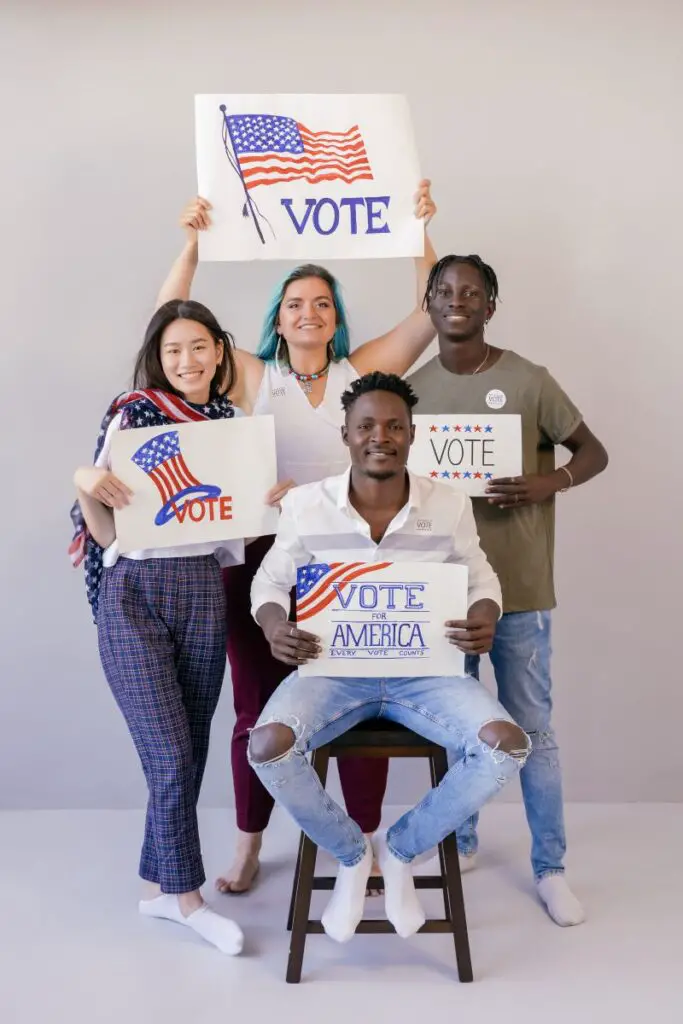Autism Stigmas: How to Champion Disability Rights in Politics
Autism stigmas, stereotypes, and misconceptions continue to persist in today’s society, despite increased awareness and advocacy efforts. These autism stereotypes in the media not only affect the everyday lives of individuals on the autism spectrum but can also have significant consequences in the political sphere.
While not surprising, it’s particularly disappointing that autism stigmas and hidden hurdles for disability rights seem to be occurring more often, rather than less, in the current political arena.
 As election races begin heating up, some harmful events are already occurring that many autism advocates, myself included, have found disturbing.
As election races begin heating up, some harmful events are already occurring that many autism advocates, myself included, have found disturbing.
Politicians sometimes seem to throw human decency and inclusion out the window when making remarks about other candidates, and many times those barbs carry a nuance of incompetency.
That’s bad.
When autism and politics connect because politicians start making insults and perpetuating the stereotypes and myths about autistic individuals and others, the public listens. And it sets back the progress that is being made for all individuals with differences.
From Ignorance to Understanding: Challenging Stereotypes of Autism in Politics
Hurtful shade was thrown in 2023 against one of the politicians who was at that time running for an elected position by attacking his public appearances with comments ranging from “a little bit on the spectrum” and “100 percent on the spectrum” to referring to him as “that guy on the spectrum.” Of course, it became a news clip heyday and only served to perpetuate autism stereotypes in the media as well.
Regardless of how I feel about a candidate and his/her views, I don’t think anyone should have disparaging spectrum labels thrown at them like it is something bad or would make someone unqualified for something.
This particular candidate has not “come out” as to being autistic, so speculating about it or negatively labeling him is as wrong as it would be for anyone to have derogatory terms thrown in his/her direction.
Flippant, demeaning comments like this hurt disability rights for us all and go against the autism laws and policies aimed at preventing discrimination in general.
Of course, almost everyone knows about another politician who made fun of someone’s mannerisms and likened the person to someone who was “less-than” worthy.
It wasn’t funny. It was shameful. It makes me wonder if I have sometimes been a target of mean remarks and have been made fun of in the past. And that hurts. Everyone deserves respect and to be treated with kindness.
Another incident made national news in 2024 when a candidate’s son was mocked for having a nonverbal learning disorder. Remember, the spouses and children of politicians are private citizens and are not public figures. They deserve privacy and respect.
 Quite frankly, it is highly annoying that political and autism stigmas still exist at all. And like with so many other disabilities, the political season seems to cast a negative light on any candidate who might not seem to fit into the box of normalcy or project expected behaviors.
Quite frankly, it is highly annoying that political and autism stigmas still exist at all. And like with so many other disabilities, the political season seems to cast a negative light on any candidate who might not seem to fit into the box of normalcy or project expected behaviors.
Like the candidate or seated politician or not, it is insulting for someone to try and demean someone by likening him or her to someone who may (or may not be) neurodivergent, and therefore not worthy.
Disability rights should always prevail. But beyond that, human decency should. It is truly disheartening.
Autism stigmas deal with social awkwardness and hyperfocus, among other things. But, not everyone who acts “weird” or “uncomfortable” has a disability. Maybe that person has anxiety or maybe that person is simply an introvert.
READ MORE about Is Autism A Disability? Surprising Reasons for the Debate
Disability Rights and Why Autism and Politics Leads to Pathologization
I’ve recently learned a new term: pathologizing. And that is certainly what seems to be happening on the political scene more and more.
Pathologizing is when a person jumps to a conclusion to diagnose either themself or someone else based on a preconceived notion, usually stemming from lack of education or information.
Stereotypes and stigmas about autism are a form of pathologizing and influence politicians in often terrible ways and negatively impact disability rights.
Those beliefs can then sometimes lead them to make harmful autism laws and policies, perpetuating inequalities and hindering progress. With autism diagnoses on the rise across the world, making negative statements about the developmental disorder is probably not the best political position either.
One estimate shows that 1 in 36 American children are on the spectrum—and all potential future voters. Another statistic that politicians should make careful note of is that researchers have found that there are many more females with autism than previously believed. The reason for the later discovery is that women mask more than men to try and fit in better into society.
READ MORE about Autism in Women Stereotypes – The Real Truth Revealed!
5 Autism and Politics Concerns That Advance Harmful Stigmas and Stereotypes
Stereotypes and Misconceptions
Autism is a complex neurodevelopmental condition that affects individuals in varying ways. However, autism stereotypes in the media often stem from a lack of understanding and misinformation.
People with autism are frequently portrayed as socially inept, lacking empathy, or possessing extraordinary savant skills. These stereotypes fail to capture the full diversity and complexity of the autism spectrum, leading to oversimplifications and generalizations.
Autism stigmas and stereotypes can be harmful as they perpetuate misconceptions and reinforce negative attitudes toward individuals with autism.
They create barriers to inclusion and can limit opportunities for individuals to fully participate in society. Politicians, as public figures, are not immune to the influence of these stereotypes and may purposely or unwittingly incorporate them into their decision-making processes. It adversely impacts autism laws and policies, and ultimately disability rights.
RELATED: Breaking Down the Top 10 Autism Stereotypes – Unveiling the Truth
Public Perception and Political Decision-Making
Public perception plays a crucial role in shaping political decision-making. When autism stigmas and stereotypes prevail, politicians may base their policy choices on inaccurate assumptions.
This can lead to the enactment of autism laws and policies that neglect the needs and rights of individuals with autism, perpetuating marginalization and stigmatization.
For example, a stereotype that people with autism lack empathy may lead politicians to overlook the importance of social-emotional support programs in schools or the workplace.
Without understanding the nuanced experiences and strengths of individuals on the autism spectrum, policymakers may fail to recognize the importance of creating inclusive environments that cater to their unique needs.
RELATED: The Truth About Autism’s Lack of Empathy Disorder Needs to Be Told
Stigmatizing Policies and Consequences
Harmful legislation can arise from misconceptions and stereotypes, resulting in detrimental consequences for those on the autism spectrum.
For example, autism laws and policies that restrict access to appropriate educational support or healthcare services can limit the opportunities for individuals on the spectrum to reach their full potential.
Such policies not only undermine the disability rights of these individuals but also hinder societal progress as a whole.
Misconceptions about the capabilities of individuals with autism can also result in policies that restrict employment opportunities or fail to provide reasonable accommodations in the workplace.
This perpetuates the cycle of unemployment and underemployment for individuals on the autism spectrum, denying them the chance to contribute their unique skills and talents to society.
RELATED: Work and Autism – What Employers Should Know About Neurodiversity
Missed Opportunities for Inclusion
When policymakers succumb to autism stigmas and stereotypes, they often overlook the valuable contributions individuals on the spectrum can make to society.
By failing to recognize the unique strengths and talents within the autism community, politicians miss out on opportunities for fostering inclusion and leveraging the potential of these individuals.
Research has shown that individuals with autism often possess exceptional abilities in areas such as pattern recognition, attention to detail, and analytical thinking.
These strengths can be assets in various fields, including technology, research, and creative arts.
By harnessing these talents and providing supportive environments, policymakers can tap into the potential of individuals with autism, leading to innovation and growth.
RELATED: Feeling Left Out – 12 Ways to Conquer Ostracism When You Have Autism
Shifting the Narrative: Advocacy and Education
To counteract the influence of stereotypes on political decision-making, it is crucial to challenge misconceptions and promote accurate history and information about autism.
Increased advocacy efforts and education campaigns can help shift the narrative and raise awareness among politicians.
By providing policymakers with a comprehensive understanding of autism, more inclusive and equitable legislation can occur.
RELATED: History of Autism – Revealing Shocking Mysteries From The Past
Shaping A More Inclusive Political Landscape and Ensuring Disability Rights
Autism advocacy organizations play a vital role in dispelling stereotypes and providing policymakers with accurate information about differences.
Through awareness campaigns, community engagement, and educational initiatives, these organizations can help shape a more inclusive political landscape as part of autism and politics.
 They can provide resources and training to politicians and their staff to ensure they have the knowledge and tools to make informed decisions that prioritize the needs and rights of individuals with autism.
They can provide resources and training to politicians and their staff to ensure they have the knowledge and tools to make informed decisions that prioritize the needs and rights of individuals with autism.
But they can’t do it alone, and organizations lack the “personal” stories that are needed to build connections and increase acceptance.
It is also essential to involve individuals with autism and their families in the policy-making process.
By including their voices and perspectives, policymakers can gain a deeper understanding of the challenges and barriers faced by the autism community.
This collaboration can lead to more effective and inclusive legislation that addresses the specific needs and concerns of individuals with autism. That means a timely and ongoing review of autism laws and policies.
Education also plays a critical role in erasing autism stigmas and stereotypes and promoting empathy, understanding, and acceptance.
By incorporating autism education into school curricula and professional development programs, we can raise a generation of informed and accepting individuals who can challenge stereotypes and advocate for inclusive policies.
Media representation is also vital in shaping public perception and challenging stereotypes. The media has the power to influence public opinion and create awareness about the strengths and challenges of individuals with autism.
By portraying accurate and diverse representations of autism in movies, television shows, and news stories, we can challenge misconceptions and promote a more nuanced understanding of the autism spectrum.
RELATED: Social Justice Issues – Why Disability Rights Matter for Autistics
Politicians Must Police Themselves and Be Proactive
Politicians themselves can and should take proactive steps to combat stereotypes about autism and promote inclusivity.
They can actively engage with the autism community, listen to their concerns, and seek their input when crafting legislation.
By including individuals with autism in advisory roles and task forces, politicians can ensure that policies are informed by the lived experiences of those affected.
Political leaders can also use their platforms to speak out against stereotypes and advocate for inclusive policies.
By publicly challenging misconceptions and promoting the rights and well-being of individuals with autism, politicians can influence public opinion and pave the way for positive change.
Misconceptions and stigmas about autism can have far-reaching consequences in the political sphere. When politicians base their decisions on inaccurate assumptions, harmful legislation can result, in perpetuating inequalities and hindering progress.
By challenging stereotypes, promoting accurate information, and involving individuals with autism in the policy-making process, we can create a more inclusive and equitable society.
Politicians must recognize the diverse strengths and needs of individuals with autism, ensuring that legislation reflects their rights and supports their well-being.
Only through dismantling stereotypes and stigmas about autism can we pave the way for a society that embraces and empowers everyone, regardless of their neurodiversity.
And, don’t forget, we have the power to vote in, and vote out, politicians who perpetuate stereotypes and set individuals back who just happen to be neurodiverse, just like me.
Additional Misconceptions That Lead To Autism Stigmas and Stereotypes
Learn more about other stigmas and stereotypes that autistics face:
- Why Labeling People Can Lead to Stereotyping and Discrimination
- Knocking Down the Stigma to Autism Obsession
- Autism Media Stereotypes: We’re Not All Geniuses, Savants, or Lonely
- Beyond Stereotypes: How Rain Man Revolutionized the Perception of Autism
- Movies on Autism Need Reality Check from Media Stereotypes
- Absurd Plot About Autism and Evolution and Why It’s Harmful
- Moving Past the Tired Conspiracy Theory of Vaccines and Autism
- Discover the Powerful Bond Between Autism and Pets
- 3 Reasons Why Pathologizing Crushes Autism Acceptance and Inclusion
- History of Autism: Revealing Shocking Mysteries from the Past